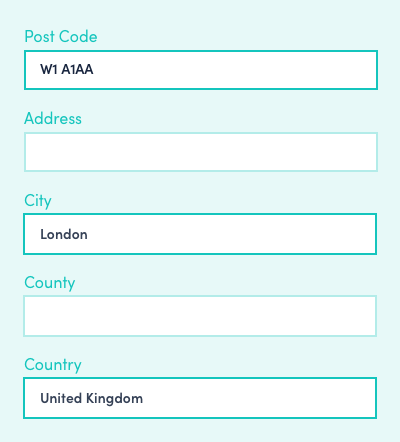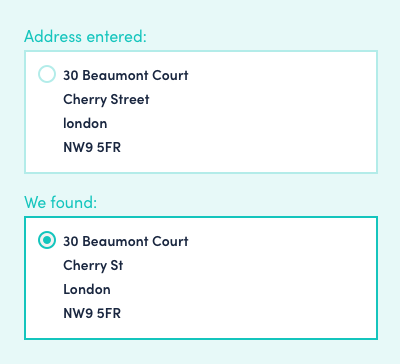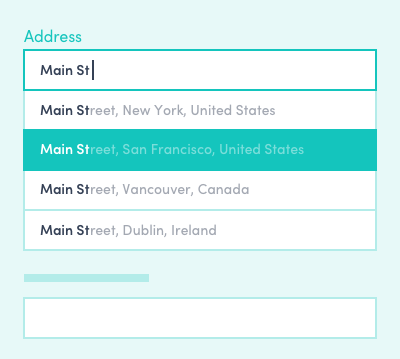Glossary
Address Verification
What is Address Verification?
Address Verification (often referred to as Address Validation - they're slightly different, but we'll cover that!) is the crucial process of checking the accuracy, completeness, and deliverability of a physical address against an authoritative, official source of truth.
It is the foundational step in data quality, ensuring that customer location data is real and usable for business operations. An address can be verified in two primary ways:
-
Real-Time Verification: Capturing and validating an address instantly at the point of entry (e.g., during checkout or form submission).
-
Batch Verification: Cleansing and enhancing millions of address records already held in a database (e.g., legacy CRM data).
Why is Address Verification Important? Key Benefits
One of the biggest challenges organizations navigate is the speed at which transactions occur, especially across international borders. Address verification solves this problem by embedding precision into high-speed processes.
Address verification brings numerous efficiency-boosting use cases to organizations. These include, but are not limited to, the following:
-
-
Secure Deliverability: Guarantees that packages, mail, and services reach the correct destination the first time, minimizing failed deliveries and costly reshipments.
-
Compliance: Ensures adherence to regulations like KYC (Know Your Customer) and AML (Anti-Money Laundering) by confirming proof of residency, especially critical in the finance and gaming industries.
-
Fraud Prevention: Helps detect fraudulent entries (e.g., non-existent addresses) by flagging locations that do not match official records.
-
Conversion Rates: Makes it faster and easier for customers to check out by auto-completing forms, directly reducing friction and boosting e-commerce conversion rates.
-
Data Quality: Enhances customer records with accurate, standardized information, which is essential for effective marketing segmentation and robust Master Data Management (MDM).
-
Address verification is important for organizations that transact with customers globally. That’s because information often gets stored within different databases or systems of record. For instance, the United States Postal Service (USPS), UPS, FedEx, Canada Post, and a range of national postal carriers maintain their own developer tools and address verification APIs.
Organizations that reach customers globally will need a simplified way to communicate with, potentially, shipping carriers in hundreds of countries.
What are the most common types of address verification?
The most common types of address verification include drop-down verification, partial verification, post-entry verification and type-ahead verification. There are some important differences between these four types of address verification that are useful to know when deciding what type is right for your website.
Drop-down verification is where the state, county and country fields can be found using a drop-down:

With partial verification, a postal or ZIP code entry populates the city and state or county, while manual entry of the rest of the address is required.

Post-entry verification is where users manually enter an address, then a pop-up shows possible alternatives, with the user required to choose the correct one.

Type-ahead verification (the kind Loqate specialize in!) is where the user starts typing their address into a single field, and as they type, increasingly accurate suggestions are offered. Clicking on a suggestion returns the full address.

What is inline address verification?
Inline verification is a way of checking the validity of data input and providing feedback before submission. It significantly enhances the usability and UX of forms, and reduces form abandonment rates by providing a quicker way to enter address details. Loqate’s address verification technology can reduce address entry time by up to 78% and cuts back data entry errors at point of capture by more than 20%, all improving the end user experience.
What is single line address finding?
The single line address lookup layout simplifies address forms down to just one field. Typing any part of the address on a single line is quick and simple, and results in address forms occupying less space. Single line address lookup is a more efficient and user-friendly approach to implementing an address look-up, and our UX research shows that users are 2x as likely to find an address and complete using single line versus multi-line.
How does type-ahead address verification differ from traditional ZIP code lookup?
Traditional ZIP code lookup |
Type-ahead |
| Lookup US addresses | Look up US and international addresses |
| Enter the ZIP code to search | Enter any part of an address to begin searching |
| Searches from a whole postcode | Allows you to miss out parts of the address or postcode and returns matches, you don’t need to know the postcode |
| Press a single button to display results | Results are displayed as soon as you start searching |
| No filtering options to narrow results | Narrow results further as you type more details of the address |
| Postcode needs to be typed without errors | Type-ahead understands common misspellings |
| Results ordered alpha-numerically | Option to order results by nearest to the user or your operational location |
| Shows all matching addresses for the ZIP code | Customisable to show only business or residential addresses, not yet built (NYB) premises and multi-residence data (NOTE: this data is not included as standard) |
| You can auto-complete the address form with the selected address | Selected address auto-completes form - you can reduce your address form to a single line |
| Easy to integrate/install | Easy to integrate/install |
| Address data from USPS database | Includes address data from Royal Mail's PAF®, Canada Post, and other international datasets. |
| As seen on: Oxfam, flybe, and more | As seen on: ASOS, Graze.com, Superdry and more |
Guide to Address Verification Methods
Behind the scenes of an address verification program, various technical processes are taking place. Understanding them will help you identify use cases for address verification in your business.
Fuzzy Matching
Address verification utilizes Fuzzy Matching technology to recognize and correct user errors. Even if a user enters a typo (e.g., "Main Strete"), the API detects the probable intended address by analyzing character differences and phonetic sound, ensuring a match is found and corrected at the point of entry.
An address verification API can also detect misspelled or missing information such as spaces and letters to create more accurate results. This technology is particularly useful for mobile digital environments that are prone to typos due to small screen sizes.
Learn more: Guide to Fuzzy Matching
Geocoding & Reverse Geocoding
Verification enhances the record by applying Geocoding—the process of assigning latitude and longitude coordinates to the physical location. This enables:
-
Optimizing deliveries and planning efficient routes.
-
Anticipating real-world risks (e.g., flood zones) for insurance and finance.
-
Enhancing customer records with enriched Sub-Premise Level Data (apartment, suite, unit) for guaranteed last-mile delivery.
Address Standardization
The process of standardizing addresses is important for ensuring that different systems communicate with each other. Every postal system requires its own official format. An API can break unstructured address data into its component parts and automatically reformat addresses into the correct output structure.
Focus on the US Market: The ZIP Code Difference
For the US market, address verification relies heavily on two crucial technical components maintained by the United States Postal Service (USPS):
1. Standardizing to the ZIP+4 Code
While a 5-digit ZIP Code identifies a specific area, the ZIP+4 Code identifies a geographical segment within that area, typically a block face, apartment building, or delivery point.
-
Missing Keyword Check: Verification software automatically appends the ZIP+4 Code to the 5-digit entry, which is mandatory for securing USPS postage discounts and achieving the highest accuracy for automated mail sorting.
2. Delivery Point Validation (DPV)
The ultimate check for US address deliverability is Delivery Point Validation (DPV). DPV confirms that the specific street number exists as a recognized mail delivery point, ensuring the address is genuine and mailable. DPV is an integral part of CASS Certification (Coding Accuracy Support System), which Loqate maintains to guarantee the highest level of US data accuracy for its clients.
Choosing an Address Verification Provider
There are a number of address verification services and API solutions available to meet different business requirements and needs. Here are some criteria to consider when selecting address verification technology for your business:
- Frequency of data updates
- Processes for safeguarding company data
- Uptime standards
- Ability to address typos
- Data sources and their integrity
- Integration and deployment time
- Back-end address verification to cleanse, parse, and standardize data in integrated software
- Additional services
- Additional datasets
- Customer support options
As organizations evolve, especially when they scale globally, address verification needs may become more complex. In these situations, paid services are available for address verification APIs that support the following use cases:
- Integrations with multiple postal carriers
- Third-party application development
- Correcting customer-generated errors
- Building a rich database
- Maintaining CRM hygiene
Successful address verification strategies support higher level business goals such as error reduction, database enrichment, and delivery speed.
Loqate helps businesses around the world verify customer addresses by combining our global datasets with best in class address verification technology. Our easy to integrate API helps our customers verify customer data at the point of capture. Find out more about how Loqate address verification solutions can help your business.